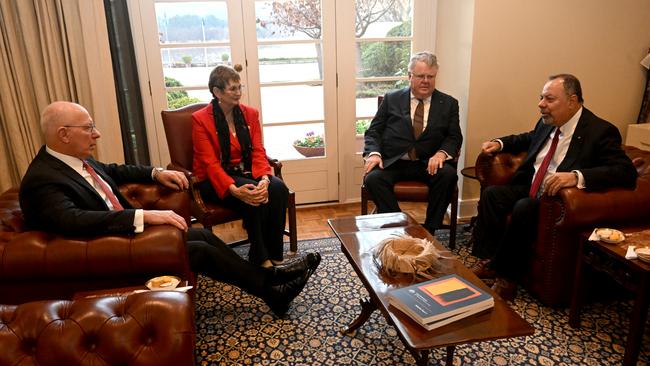Opinion: Commissioners optimistic real change is coming for Defence and veterans
The Royal Commission into Defence and Veteran Suicide is not about portraying veterans as broken or about undermining Australia’s Defence capability or proud military history, writes Commissioner Nick Kaldas.
Opinion
Don't miss out on the headlines from Opinion. Followed categories will be added to My News.
Australia has a proud military past.
Our Diggers – known for their courage, egalitarianism, endurance and mateship – have helped shape what it means to be Australian. And we’ve vowed never to forget the sacrifice of those who fought and died for the freedoms we enjoy today.
But what’s clear – at the midway point of this Royal Commission – is we as a nation need to better protect and support the health and wellbeing of those who have served and who continue to serve in our armed forces.
Every life lost to suicide is a heartbreaking event. The impact on family, friends, colleagues and the broader community is profound.
A report from the Australian Institute of Health and Welfare in December revealed 1600 veterans* had taken their lives between 1997 and 2020. Sadly, it’s rare for a week to go by that we aren’t alerted to another death.
We Commissioners are acutely aware of the significance of our inquiry. Despite dozens of inquiries and hundreds of recommendations preceding this Royal Commission, it is clear not enough has been done by Governments, the Australian Defence Force and Departments of Defence and Veterans’ Affairs over the past two decades.

Our recommendations must help to change the environment – and ensure action is taken. The success or otherwise of the measures adopted from our recommendations must also be assessed.
Over the past 18 months, we’ve undertaken a broad sweep of our terms of reference -identifying common themes, cultural and systemic issues and risk factors that contribute to suicide and suicidality in the Defence and veteran communities.
You’d think, given our diverse backgrounds – experienced former cop, retired supreme court judge and leading psychiatrist – there wouldn’t be much that would move us.
But sitting one-on-one with serving and ex-serving members, families and friends as they’ve shared their deeply personal stories of suicide and self-harm has been powerful.
When recounting their experiences of military life, many serving and ex-serving members have revealed harrowing incidents of abuse, bullying, discrimination, harassment and hazing, as well as the additional trauma caused by the organisation failing to acknowledge what they’ve been through. This has been disturbing.
And then there’s the fight for entitlements which has made life difficult for far too many serving and ex-serving members … and, indeed, cost lives.
Despite how bleak the situation is, there is cause for optimism.

Our interim report last August made 13 urgent recommendations to improve the lives of serving and ex-serving members. Eleven of those have been adopted by Government.
Laws governing how veterans are compensated are to be overhauled, consolidating three complex compensation schemes into one simplified system. Additional resources have been committed to the Department of Veterans’ Affairs (DVA) to eliminate the backlog of 42,000 unprocessed claims by March next year.
And we’ve signed an agreement with Defence and DVA to ensure serving and ex-serving members and Departmental staff can share information with us without the fear of reprisal.
It’s heartening to see some progress but we still have a lot of work to do – and the issues under examination are complex, multi-layered … and many.
Recently, we were saddened to learn the circumstances of the death of another veteran whose fight with the DVA for entitlements, among other reasons, contributed to his untimely passing. This received wide coverage in (your newspaper) after his family revealed his last written words, which touched the hearts of many.

We’ve been hearing about a sense of hopelessness and despair in the veteran community following this event.
It’s important that we acknowledge the immense pain left when someone takes their life – for family, friends, the Defence and veteran communities. This sense of loss might cause you to wonder what could possibly be achieved by this Royal Commission and whether this is just another inquiry which will be ignored by Government.
We assure you that we three Commissioners have made a very strong commitment to work together to bring about long-lasting cultural and systemic change.
We’re also keen to make one thing very clear.
This Royal Commission is not about portraying our troops and veterans as broken. The large majority have fulfilling careers both in the military and after they leave the services. Nor do we seek to undermine Australia’s Defence capability or proud military history.
To the contrary.
We aim to bring about long-lasting structural and cultural change to better support our serving and ex-serving members and their families; and build a stronger, more resilient and better ADF for Australia’s future defence needs.
*Veterans who had served on or after 1 January 1985.
Commissioner Nick Kaldas is Chair of the Royal Commission into Defence and Veteran
Suicide.




